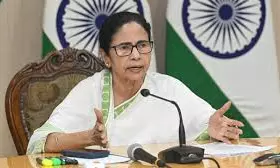The labour of love
Amid the bevy of clichés surrounding February 14, there is one annoying but enduring truth. If Valentine’s Day comes, can noisy and violent protesters be far behind;
Amid the bevy of clichés surrounding February 14, there is one annoying but enduring truth. If Valentine’s Day comes, can noisy and violent protesters be far behind A group that calls itself Sanskriti Bachao Manch popped up inside a temple in Bhopal this week, to get their hockey sticks and batons blessed. It was a moral, mortal warning to Bhopal residents in case they dared to celebrate Valentine’s Day. Another group, the Sri Ram Sene, struck in Jammu and Kashmir. They led protest marches and burnt Valentine’s Day greeting cards in front of the Jammu Press Club. In Amritsar, florists are trying to hide bouquets from the moral police who frown at the exchange of flowers between a man and a woman. Across the border there has been copycat frothing and fuming about young people and romantic love. Once again, with an unerring eye on headlines, the student wing of Jamaat-e-Islami in Pakistan staged a noisy rally protesting against Valentine’s Day and demanding a “day of modesty” in front of the press club in Peshawar. And so it goes on, year after year. The horror of the gangrape in a Delhi bus is still very fresh in our minds. Many young people in this country are getting ready to take to the streets today as part of the One Billion Rising global campaign to end gender violence. The continuing savagery on women and girls is galvanising the political and social discourse, especially after the recent report that one-third of women in this world have been victims of sexual violence sometime or the other. In this situation, why should we bother about sundry protests or the palaver surrounding Valentine’s Day Indeed, it is tempting to dismiss red roses, romantic escapades, champagne buckets, heart-shaped chocolates, and all the stuff that trill “20 per cent off” in this season of love. It is equally tempting to brush aside those who ritually demonise young love as the “vulgar” face of Western cultural influence on a specific day every year as a lunatic fringe out to grab their 15 seconds of fame. But Valentine’s Day and all the shenanigans around it are not to be scoffed at. It matters in today’s India because it shows up the pulls and pressures that the young have to face. Despite its undoubtedly commercial odour, Valentine’s Day signals a vote for personal choice. On this day, young men and women who meet in coffee shops, restaurants, parks, movie theatres and other places are celebrating freedom, choice and friendship. Though many of them belong to traditional families, on this day they celebrate a relationship that is not of their parents’ making or elders. This is a baby step. But it is still something that makes most Indian families uncomfortable. Love stories abound in our mythology, in our literature, in our folk tradition, in our films and in all the advertisements that flash on the television screen. In real life, however, there is acute fear of love, especially in its full-blooded, romantic form. It is acceptable to celebrate a relationship only if it is brokered by parents or elders and relatives or signifies a bond of cosy domesticity. The rage really is against free choice and those who advocate such a philosophy. Should the war against romantic love in the country led by self-styled protectors of Indian culture be taken at face value There are many loopholes in the arguments put forward by Sri Ram Sene, Bajrang Dal and their fellow travellers. They slam Valentine’s Day as a Western cultural imposition. What about Mother’s Day and Father’s Day When was the last time one heard of activists raging at Mother’s Day greeting cards Then there is the argument that Indian culture does not need special days to demonstrate love for a special someone because we are so loving all 365 days of the year. If that is so, it is not clear why we celebrate Karva Chauth or Raksha Bandhan. Why do wives have to fast or sisters tie rakhis on one particular day of the year Isn’t that also symbolic of a bond So what is wrong with Valentine’s Day The real issue here is not the fear of Western culture but fear of losing control. A young person who has taken the first tentative step to go out with someone of his or her choice may be less amenable to a relationship brokered by family elders. The deeper societal fear is that if this is allowed, all the barriers separating castes and religions will come crashing down and the social structure as we know it could collapse. If youngsters were free to love without fear or favour, what would happen to the traditional social structure premised on marriages that are arranged by parents and family elders and its new-age support system — the Internet portals that subsist on caste and religion-based matrimonial advertisements Love in its romantic and passionate avatar does not only worry the moral police or the elders in the family. Ironically, very many among the young are equally nervous about the free choice and all that it portends. Making personal choices is part of growing up, part of leading one’s own life in most societies. But in a society which is all about control — by the family, by the village, by the caste, by the moral police, by whoever is in a position to exert control it is a revolutionary act that invites swift retribution. This can take the form of scolding, emotional blackmail, financial threats, ostracism, public humiliation, getting beaten up or even getting killed. There are myriad ways of analysing this but, at its core, it is all about denying choice in the one field where choice is most important — looking for a partner to spend one’s life with. If a few people are willing to stand up for choice today, they deserve all our support. And the red roses.
The writer focuses on development issues in India and emerging economies. She can be reached at patralekha.chatterjee@gmail.com





